Roblox
Roblox, an online game platform and game creation system, was co-founded by David Baszucki and Erik Cassel in 2004 and officially released in 2006. David Baszucki, often referred to by his Roblox username "builderman," has a rich background in software development and entrepreneurship. Before Roblox, Baszucki founded Knowledge Revolution, a company that developed physics simulation software. His experiences with Interactive Physics and Working Model, which were especially popular among students, inspired him to create Roblox, a platform designed to foster creativity and learning through play (Wikipedia) (Wikipedia).
Baszucki's vision was to create a space where people of all ages could build and share their own games. Today, Roblox boasts over 164 million monthly active users, with more than half of all American children under 16 having used the platform at some point (Wikipedia). The platform's success has been recognized with several accolades, including being listed among the top mobile game developers and featured in "Fast Company's" list of the most innovative companies (Wikipedia).
Differentiation: What Makes It Special
What sets Roblox apart from other educational platforms is its unique combination of game creation and social interaction. Unlike many other programs, Roblox allows users to create their own games using its proprietary engine, Roblox Studio, and play games created by others. This not only fosters creativity but also encourages a deep understanding of programming and game design. The platform’s use of the Lua programming language and the ability to monetize creations through virtual currency (Robux) provides practical experience in both coding and economics.
How to Get Started
To get started with Roblox, parents and students need to create a free account on the Roblox website. Once registered, they can download and install Roblox Studio, the platform's game development environment. Users can explore millions of user-created games or start building their own. Roblox offers tutorials and a supportive community to help new users learn the basics of game development.
How It Works as a Homeschooling Program
Using Roblox as a homeschooling program involves integrating it into a structured schedule. It's recommended that students spend about 1-2 hours per day on the platform, engaging in both game creation and playing educational games. Activities can include coding lessons, game design challenges, and collaborative projects with other homeschoolers. While Roblox can be used independently, parental involvement is beneficial for guiding educational goals and monitoring content.
Does Roblox Have Educational Value?
The educational value of Roblox is a topic of much debate among educators, parents, and tech enthusiasts. On one hand, there are several compelling arguments in favor of its educational benefits. Roblox teaches programming through Lua, offering a hands-on approach to coding that can be far more engaging than traditional methods. It encourages creative thinking and problem-solving as users design and build their own games. Additionally, the platform fosters collaboration and community engagement, providing opportunities for teamwork on projects. From an entrepreneurial perspective, Roblox introduces economic principles through its virtual currency, Robux, allowing users to earn money from their creations, which can be an invaluable learning experience.
However, there are notable concerns as well. Content moderation on Roblox has been a significant issue, with parents worried about the exposure to inappropriate content and online safety. The platform's microtransaction model poses risks of overspending, especially among younger users who might not fully grasp the implications of in-game purchases. Moreover, the immersive nature of Roblox can lead to excessive gaming, potentially distracting from educational and other important activities (Wikipedia) (Wikipedia).
Educational Skills Kids Can Develop Playing Roblox
Roblox is more than just a gaming platform; it offers a multitude of educational benefits that can help children develop a wide range of skills critical for their overall development. Here's a closer look at some of the key skills that kids can develop while playing Roblox:
Programming and Coding
Roblox uses a programming language called Lua, which is known for its simplicity and ease of learning. As children create games on the platform, they learn to write code, debug errors, and understand programming logic. This hands-on experience can build a strong foundation in computer science, preparing them for more advanced coding languages and concepts in the future (Wikipedia) (Wikipedia).
Game Design and Development
Creating games on Roblox involves more than just coding. It requires a deep understanding of game design principles, including user experience, level design, and storytelling. Kids learn to design engaging, fun, and functional games that can capture the interest of other players. This process encourages them to think critically about what makes a game enjoyable and how to implement those elements effectively (Wikipedia) (Wikipedia).Problem-Solving
Roblox presents numerous challenges that require creative problem-solving skills. Whether it’s figuring out how to create a specific game mechanic or debugging a piece of code, kids are constantly engaged in critical thinking and troubleshooting. This iterative process helps them develop resilience and persistence as they work through problems to achieve their goals (Wikipedia) (Wikipedia).Logical Thinking
Programming in Roblox enhances logical thinking as children learn to sequence actions, use conditional statements, and apply logical operators. These skills are not only essential for coding but also for understanding and solving complex problems in various academic subjects like mathematics and science (Wikipedia) (Wikipedia).Economic Principles
Roblox includes an in-game currency called Robux, which players can earn, trade, and spend within the platform. Managing Robux helps children learn basic economic principles such as supply and demand, budgeting, and the value of money. This experience provides a practical understanding of financial literacy, which is a crucial life skill (Wikipedia) (Wikipedia).Project Management
Creating a game on Roblox from start to finish requires planning, organizing, and managing various tasks and resources. Kids learn to set goals, manage their time, and coordinate different aspects of game development. These project management skills are valuable in both academic and professional settings, where managing projects effectively is key to success (Wikipedia) (Wikipedia).Social Skills
Roblox is a social platform where players can collaborate on projects, share their creations, and communicate with others. This interaction helps children develop social skills such as teamwork, communication, and leadership. Participating in group projects and guilds can also teach them about cooperation, negotiation, and conflict resolution (Wikipedia) (Wikipedia).Creativity and Innovation
Roblox provides a creative outlet for kids to express their ideas and bring their imaginations to life. Whether they are designing new game worlds, creating unique characters, or scripting original game mechanics, the platform fosters creativity and encourages innovative thinking. This creative process is not only enjoyable but also enhances cognitive flexibility and artistic skills (Wikipedia) (Wikipedia).Communication Skills
Effective communication is essential in Roblox, whether it's explaining a game concept, collaborating with team members, or providing feedback. Kids learn to articulate their ideas clearly and concisely, both in writing and verbally. These communication skills are crucial for academic success and are highly valued in the professional world (Wikipedia) (Wikipedia).
What’s Good About It
Users love Roblox for its endless possibilities. The platform is praised for its ability to foster creativity and innovation among young users. Parents and educators appreciate the practical coding experience it offers and the engaging way it teaches complex subjects like game design and economics.
What Could Be Improved
Roblox has faced criticism for its content moderation and the potential for exposure to inappropriate material. Additionally, the platform's reliance on microtransactions can be problematic, leading to concerns about spending and the ethical implications of targeting children with in-game purchases. Improving moderation and providing more robust parental controls could enhance its educational value (Wikipedia) (Wikipedia).
Advice from Parents on How to Get the Most Out of It
Set Clear Boundaries: Establish rules for screen time and in-game purchases.
Engage Together: Participate in game creation and play to guide educational activities.
Use Educational Resources: Leverage Roblox’s tutorials and educational content.
Monitor Activity: Regularly check in on what your child is creating and playing.
Encourage Collaboration: Promote teamwork with other homeschoolers or friends.
Should Parents Limit Children's Time on Roblox?
When it comes to limiting children's time on Roblox, opinions are divided. Proponents of time limits argue that it helps maintain a balanced lifestyle, ensuring that children engage in a variety of activities beyond screen time. Managing screen time effectively can reduce the risks associated with prolonged exposure to screens, such as eye strain and disrupted sleep patterns. Moreover, limiting time on Roblox can help children stay focused on their educational goals and other responsibilities.
On the other hand, there are compelling reasons against imposing strict time limits. Roblox can significantly contribute to creative development, providing a platform for children to explore coding and game design in a fun, interactive environment. Limiting time might also reduce opportunities for social interaction and teamwork, as many children use the platform to connect with friends and collaborate on projects. Furthermore, overly restrictive limits could diminish children's engagement and motivation, potentially turning a beneficial activity into a point of contention (Wikipedia) (Wikipedia).
Approaches to “Screen Time”
How you approach screen time, and limits on screen time is a deeply personal decision, and there’s no right answer, especially as research and new technologies continue to emerge to support children’s learning (and provide, sometimes overly addictive, modes of entertainment). We don’t shame parents for using screens to distract kids so they can get a moment of peace. And we don’t shame kids for being excited about online engagement. The word screen time is so ubiquitous, but there are so many forms of screen time, educational time, time that you’re involved with friends and family and time that’s purely entertaining, or even addictive. Here are what three experts with very different opinions have to say about how to approach this delicate topic.
Peter Gray
Peter Gray, an evolutionary psychologist, argues against strictly limiting children's screen time. He believes that self-directed play, including digital play, is crucial for development. Gray asserts that screens can offer significant learning opportunities, social interaction, and creative outlets, similar to traditional forms of play. According to him, strict screen time limits may hinder these benefits and reduce children's ability to engage in self-directed activities that foster critical thinking and problem-solving skills. He emphasizes that play is a vital component of a child's development, whether it occurs in physical or virtual spaces (Psychology Today) (Unschooling Family) (Stand Together).
Nir Eyal
Nir Eyal, author of "Indistractable," recommends a balanced approach to screen time. He emphasizes prioritizing relational time, self-directed activities, and other ways for children to gain a sense of accomplishment. Eyal suggests involving children in the creation of screen time limits, ensuring these rules align with the family’s values and goals. By addressing the root causes of excessive screen use and encouraging healthy habits, Eyal believes children can benefit from digital devices while avoiding negative impacts. This collaborative approach helps children understand and respect the boundaries, fostering a healthy relationship with technology.
In this interview, Eyal explains his methodology and goes in-depth with his own approach to navigating screen time with his daughter.
Janet Lansbury
Janet Lansbury, a well-known advocate of respectful parenting, advises parents to use mindfulness and balance when approaching screen time. She encourages prioritizing real-life interactions and physical play over digital activities, especially for younger children. Lansbury acknowledges the inevitability of screens in modern life but stresses setting boundaries that prevent screens from becoming the primary source of entertainment. Her approach focuses on ensuring that screen time does not replace essential developmental activities like outdoor play, creative pursuits, and direct social interactions, helping children develop holistically (Unschooling Family).
Overall Educational Value Score: 64/100
Roblox scores well in terms of engagement, uniqueness, and value, offering a versatile platform for creativity and learning. However, concerns about addictive components and the potential for exposure to inappropriate content reduce its overall score. Parents should balance Roblox use with other educational activities and maintain oversight to maximize its benefits.
Positive Score
Uniqueness (10/10): Roblox stands out due to its innovative blend of game creation and social interaction. It allows children to build and play games, fostering creativity and coding skills in an engaging environment (That Homeschool Family) (Kinjo - Where education meets engagement).
Engagement (9/10): Most children find Roblox highly engaging. The platform’s interactive nature and the ability to play and create games make it a favorite among young users, particularly those interested in gaming and programming (Homeschool Hideout) (Smart Social).
Accuracy (7/10): While Roblox itself does not guarantee the accuracy of educational content, many user-created games on the platform are designed with educational objectives in mind, providing reliable learning experiences in subjects like math and science (That Homeschool Family) (Kinjo - Where education meets engagement).
User-Friendliness (8/10): Roblox is generally user-friendly, with an intuitive interface that allows children to navigate and create games. However, there can be occasional bugs and technical issues (Kinjo - Where education meets engagement) (Smart Social).
Pedagogy (8/10): The educational potential of Roblox is significant, particularly in teaching coding, problem-solving, and project management. It aligns well with various developmental stages by providing different levels of game complexity (That Homeschool Family) (Kinjo - Where education meets engagement).
Homeschooling (9/10): Homeschool parents appreciate Roblox for its ability to integrate learning with play. Games like Brainika Math offer structured educational content in a fun format, making it a valuable tool for homeschoolers (That Homeschool Family) (Homeschool Hideout).
Learning Focus (7/10): Roblox emphasizes experiential learning through game creation and problem-solving rather than traditional test preparation, promoting deeper understanding and practical skills (That Homeschool Family) (Kinjo - Where education meets engagement).
Personalization (8/10): Roblox allows for significant customization in game design, catering to individual learning needs and preferences. This flexibility makes it suitable for a wide range of learners (That Homeschool Family) (Homeschool Hideout).
Special Needs (6/10): While Roblox has some features that can be beneficial for children with learning disabilities, such as customizable learning experiences, it does not specifically cater to these needs as comprehensively as some dedicated educational programs (Homeschool Hideout).
Value (9/10): Roblox offers excellent value as it is free to use, with optional in-game purchases. Educational games like Brainika Math provide additional value through affordable subscriptions (Homeschool Hideout) (Smart Social).
Total Positive Score: 81/100
Negative Score
Boredom (2/10): Roblox is rarely considered boring due to its vast array of games and activities. Most children find it highly engaging and entertaining (Kinjo - Where education meets engagement) (Homeschool Hideout).
Addictive Components (7/10): Some parents express concerns about the addictive nature of Roblox, as it can be challenging to limit screen time due to its engaging gameplay and social aspects (Smart Social).
Violence (3/10): While Roblox itself is not inherently violent, the user-generated content can sometimes include games with violent themes, which can be inappropriate for younger children (Smart Social).
Unhealthy Competition (4/10): Some games on Roblox may foster unhealthy competition, but many also promote teamwork and collaboration, balancing the competitive elements (Kinjo - Where education meets engagement) (Smart Social).
Excessive Prioritization of School Standards (1/10): Roblox does not overly prioritize traditional school standards, focusing instead on experiential learning and creativity (That Homeschool Family) (Kinjo - Where education meets engagement).
Total Negative Score: 17/50
Who It’s an Ideal Fit For
Roblox is ideal for children who have an interest in coding, game design, and creative projects. It's particularly suited for self-motivated learners who enjoy interactive and hands-on learning experiences. Families looking for a flexible, engaging, and modern approach to education will find Roblox a valuable tool.
Who It’s Probably Not a Fit For
Roblox may not be suitable for very young children or those who struggle with self-regulation and screen time management. Parents concerned about online safety and content moderation might prefer more controlled educational environments.
Grades
Roblox is versatile and can be adapted for various educational levels, generally suitable for grades K-12 depending on how it is used.
Cost
Roblox is free to use, with optional in-game purchases available through the virtual currency Robux. These purchases can range from a few dollars to more substantial amounts depending on user preference.
Ways to Get It
Roblox can be accessed by creating an account on the Roblox website and downloading the necessary software. Robux can be purchased online, and premium memberships are available for additional benefits.
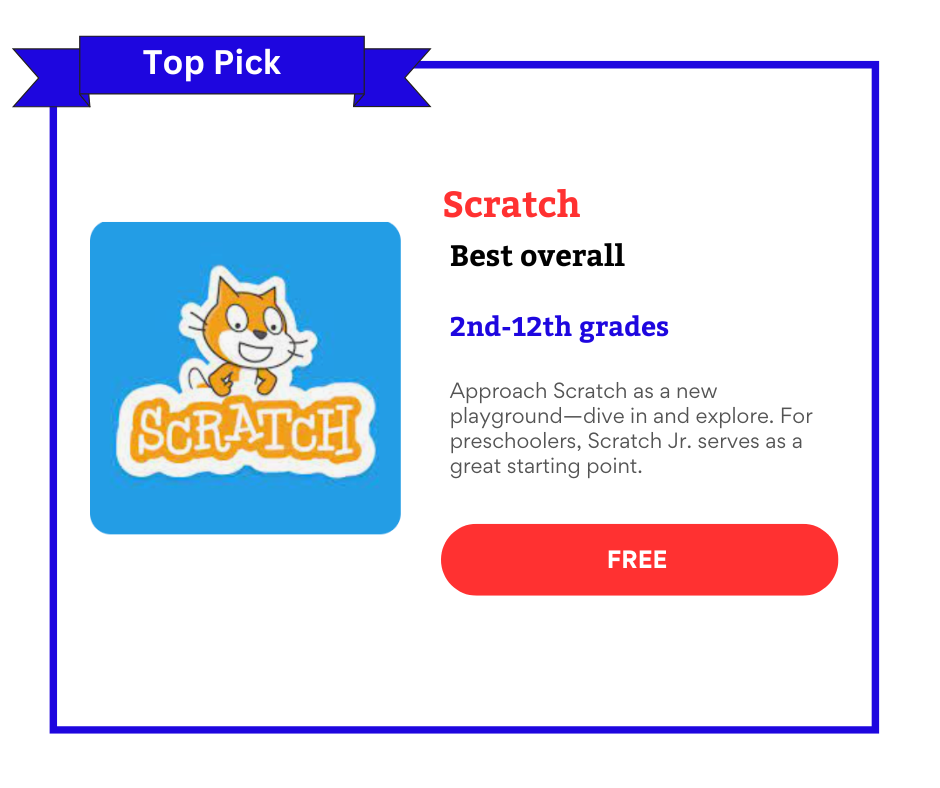


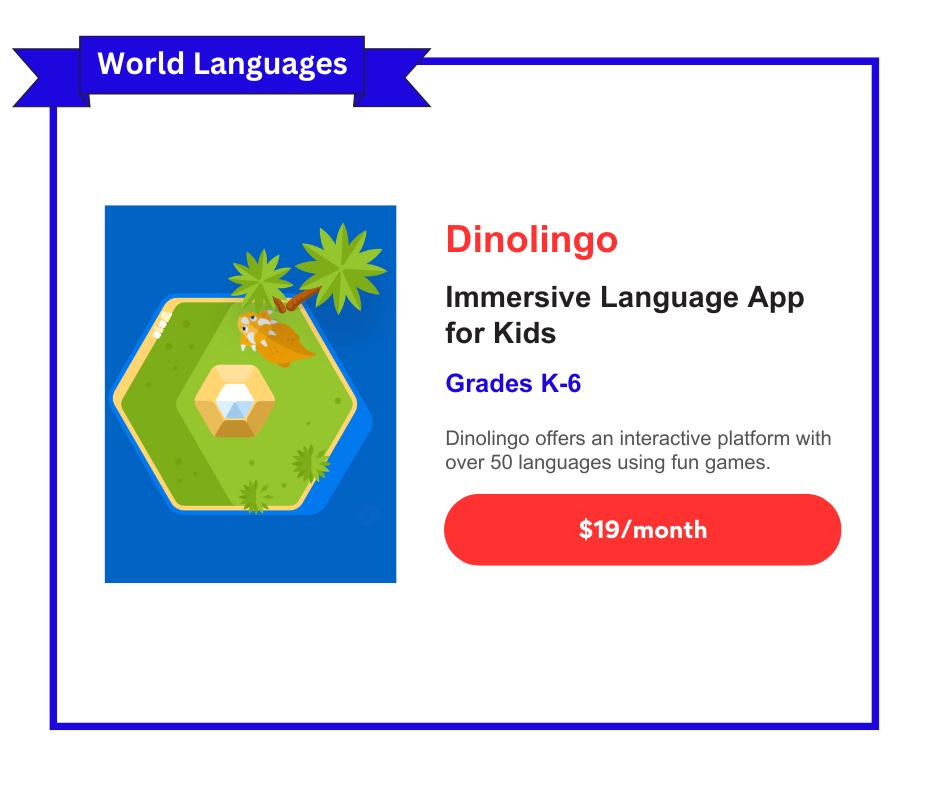
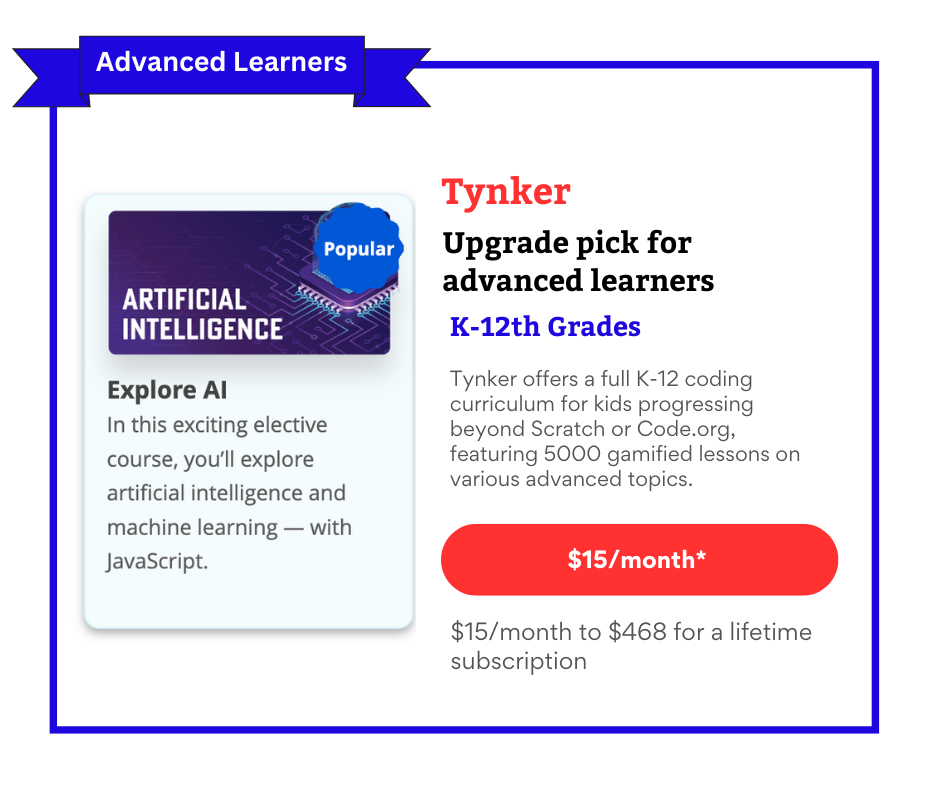
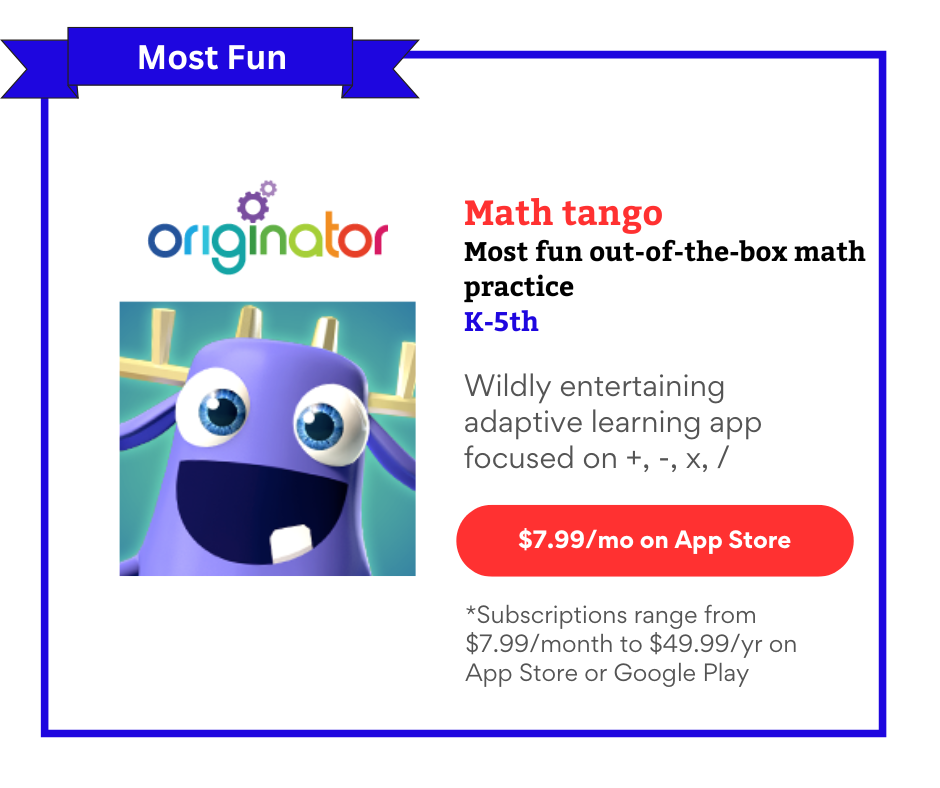
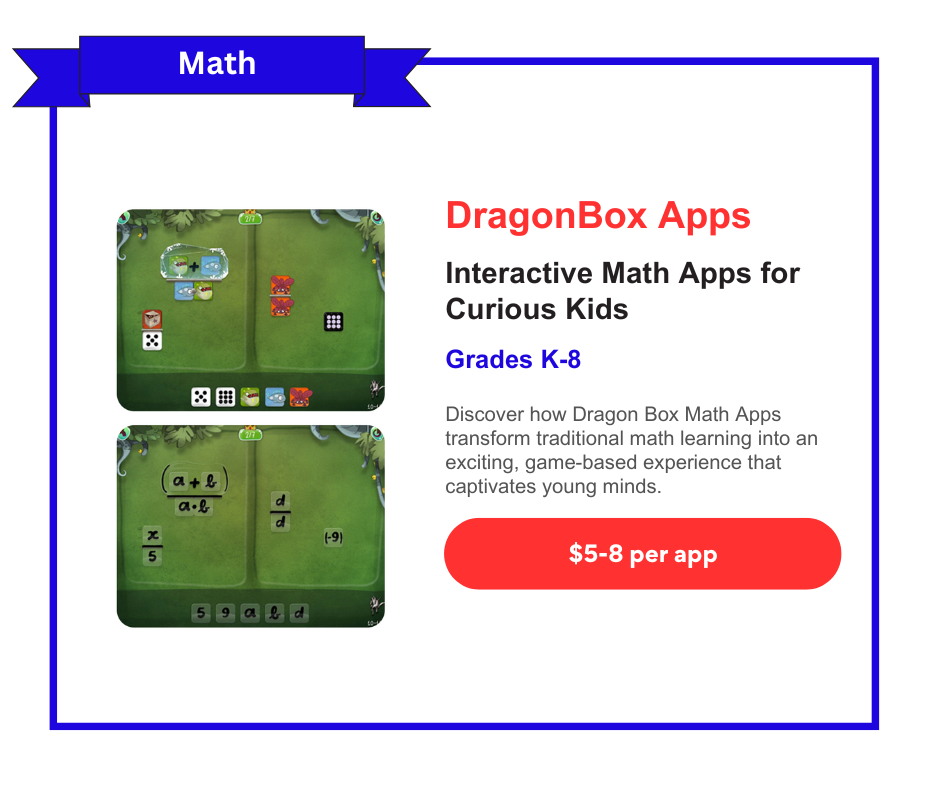
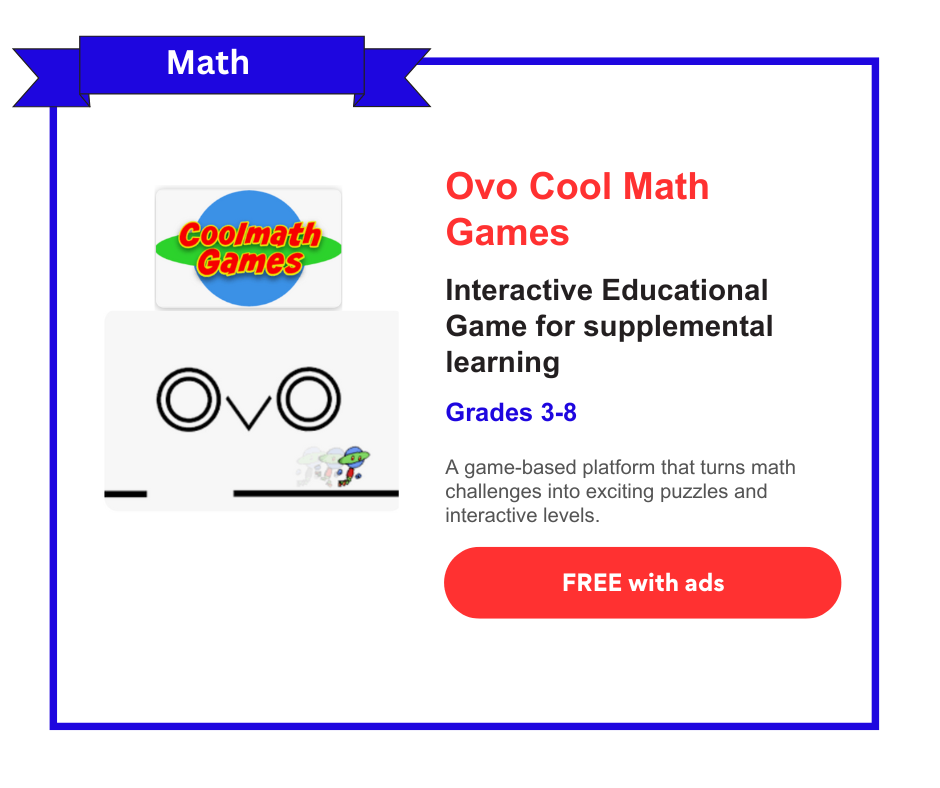


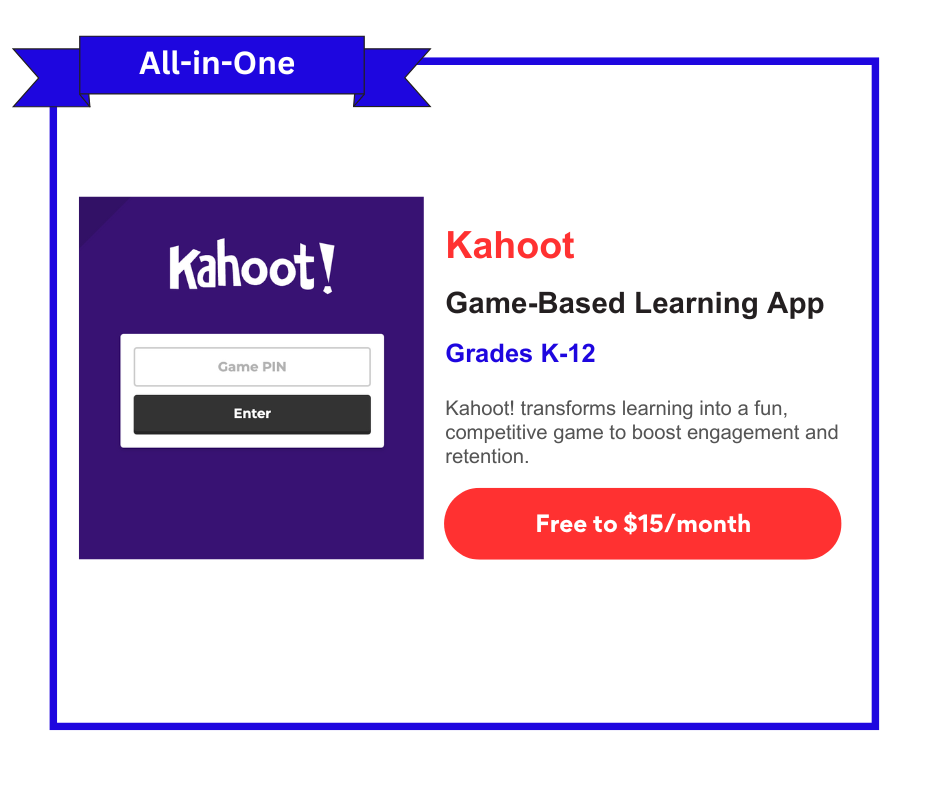
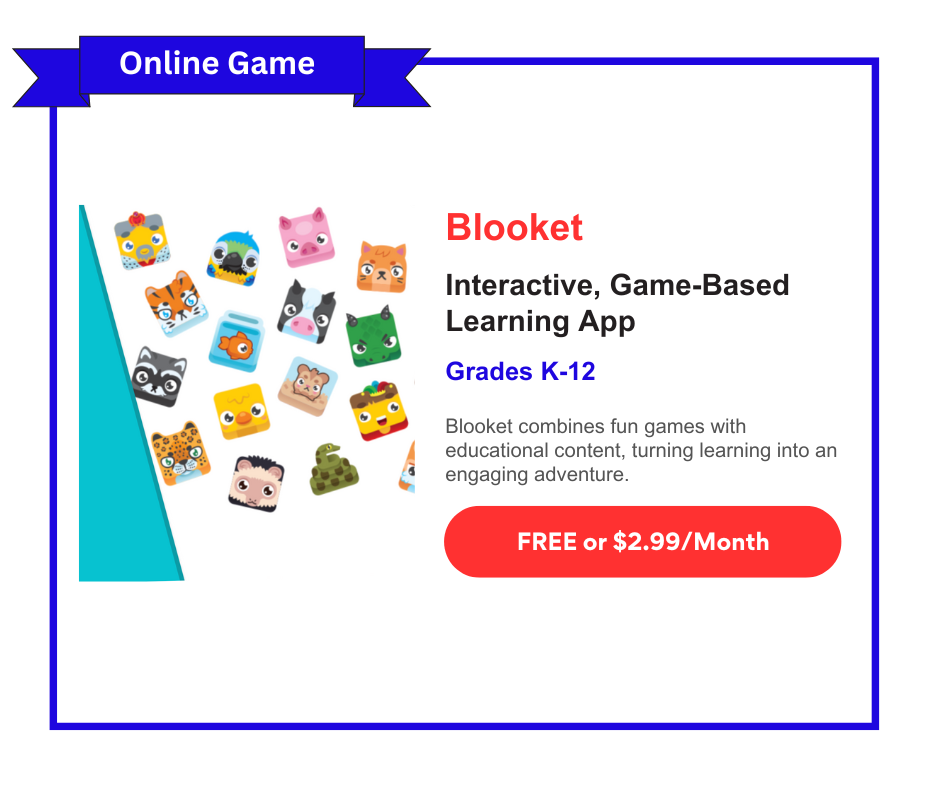


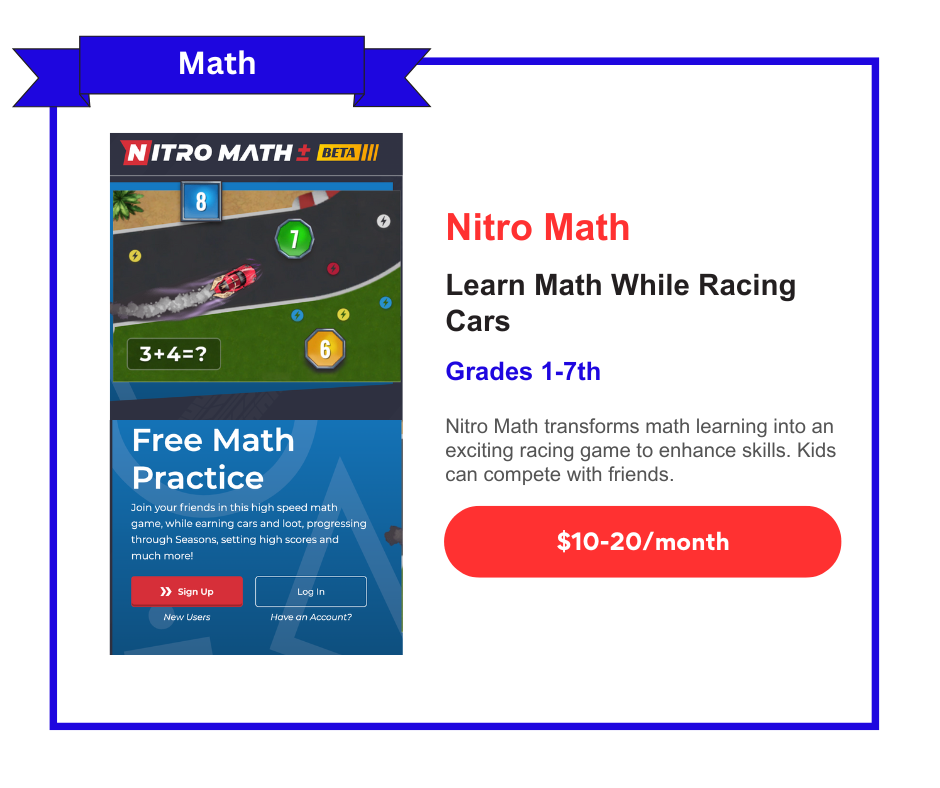
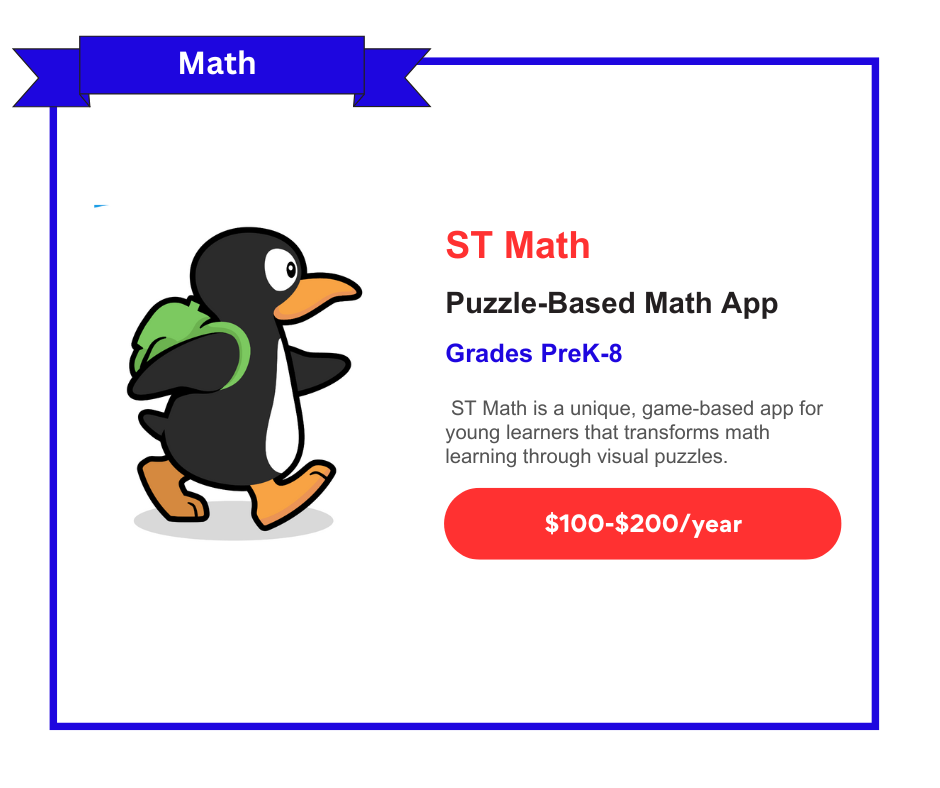
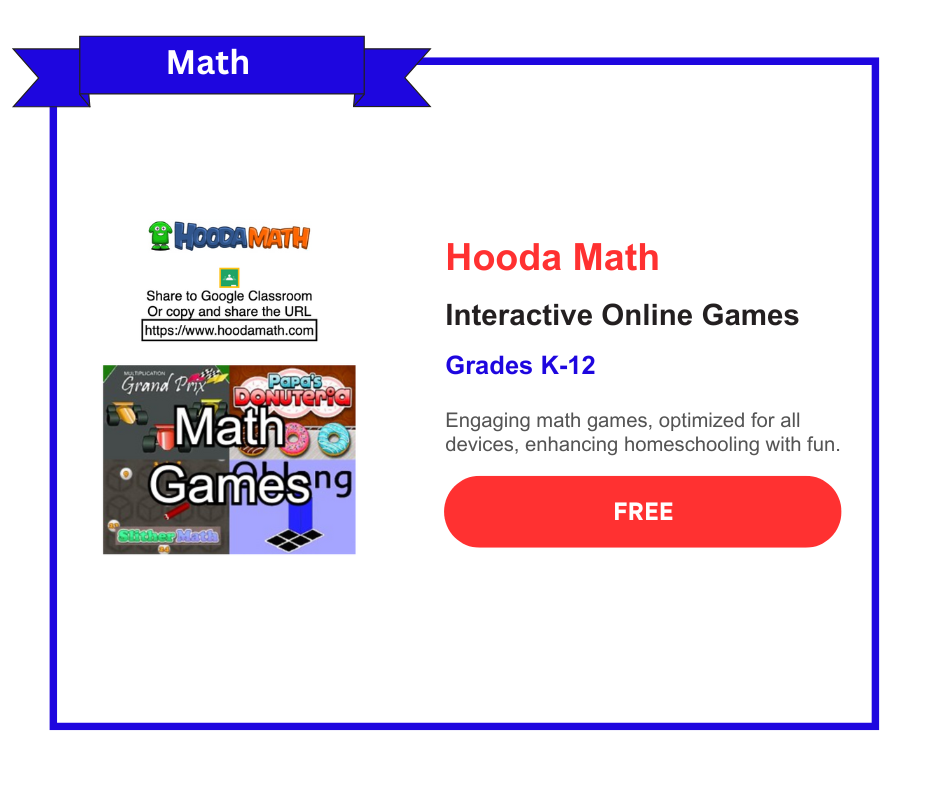
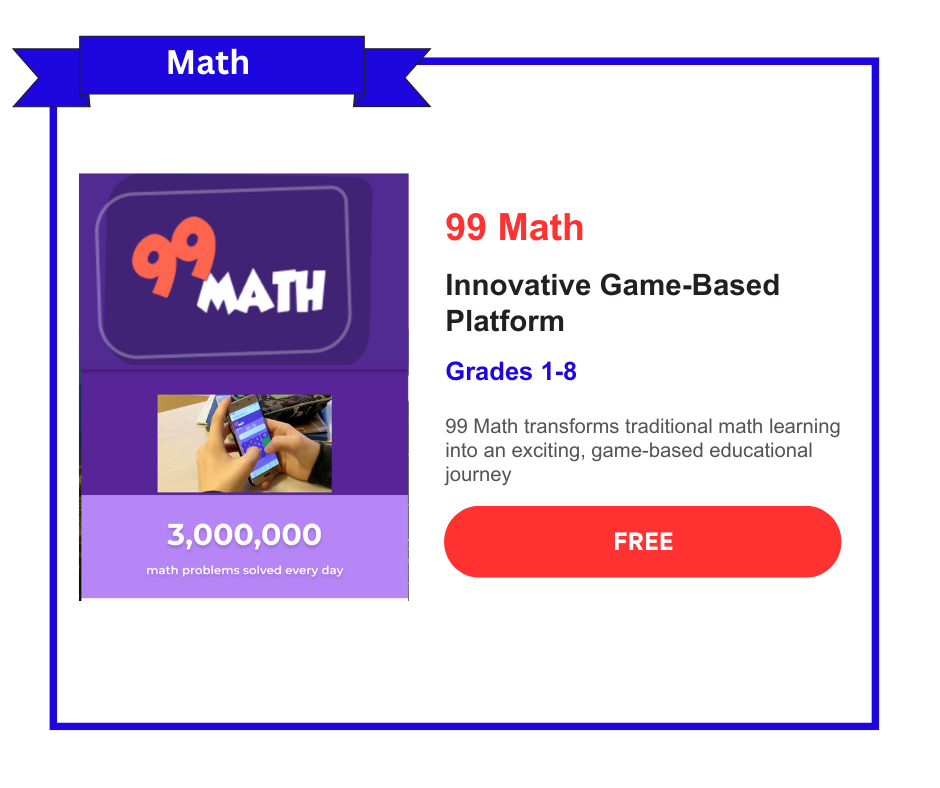

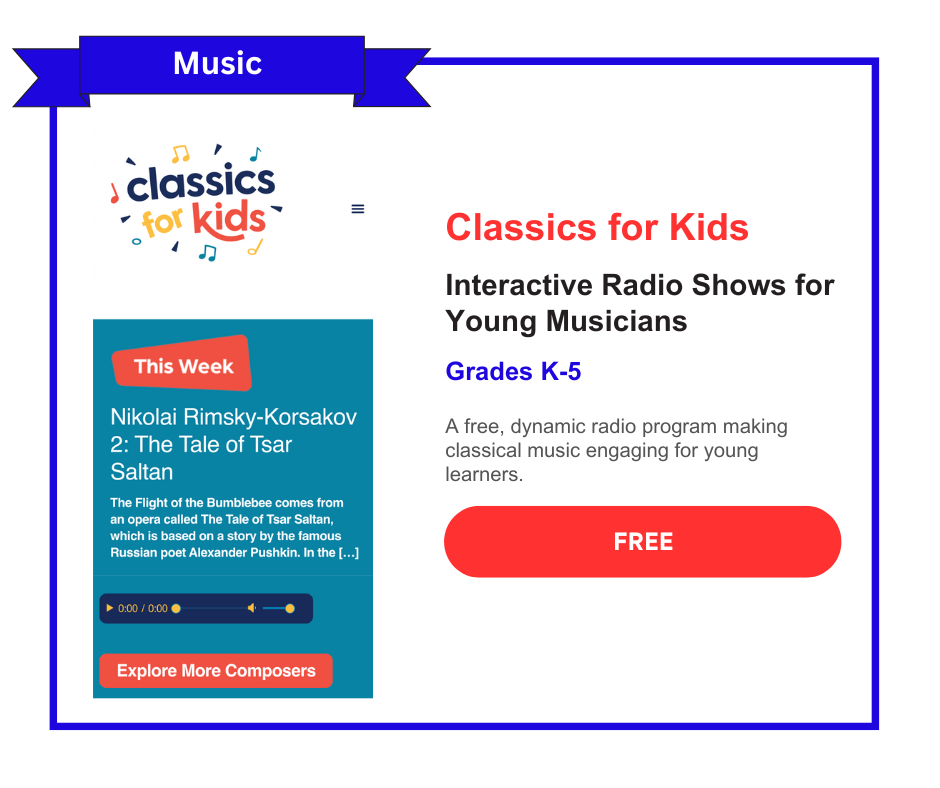
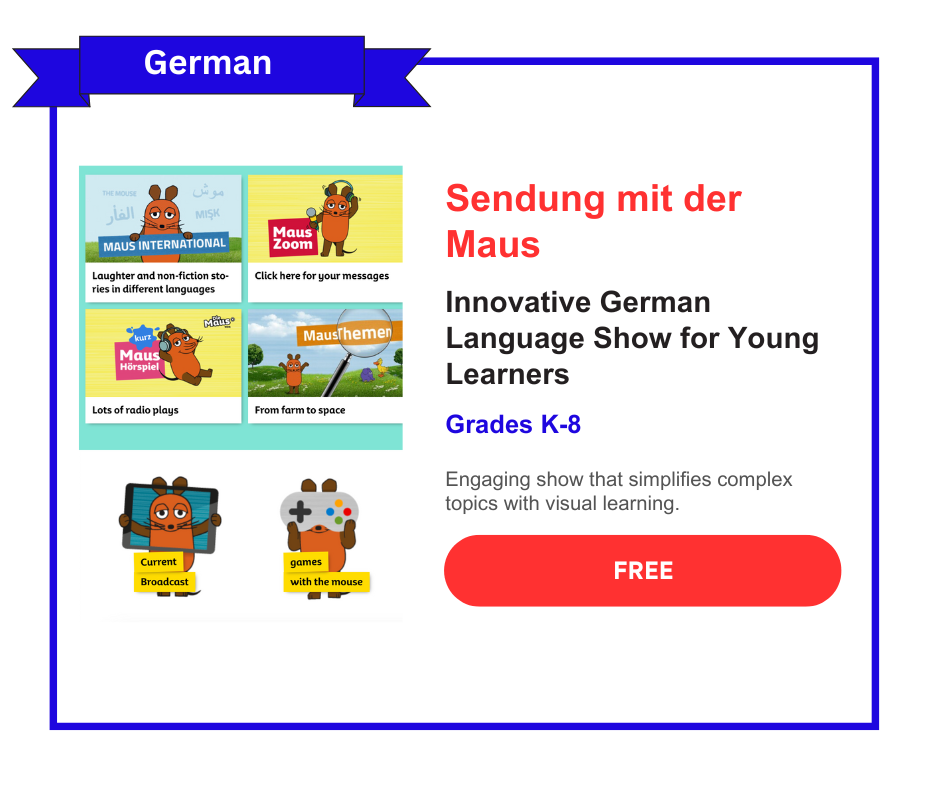
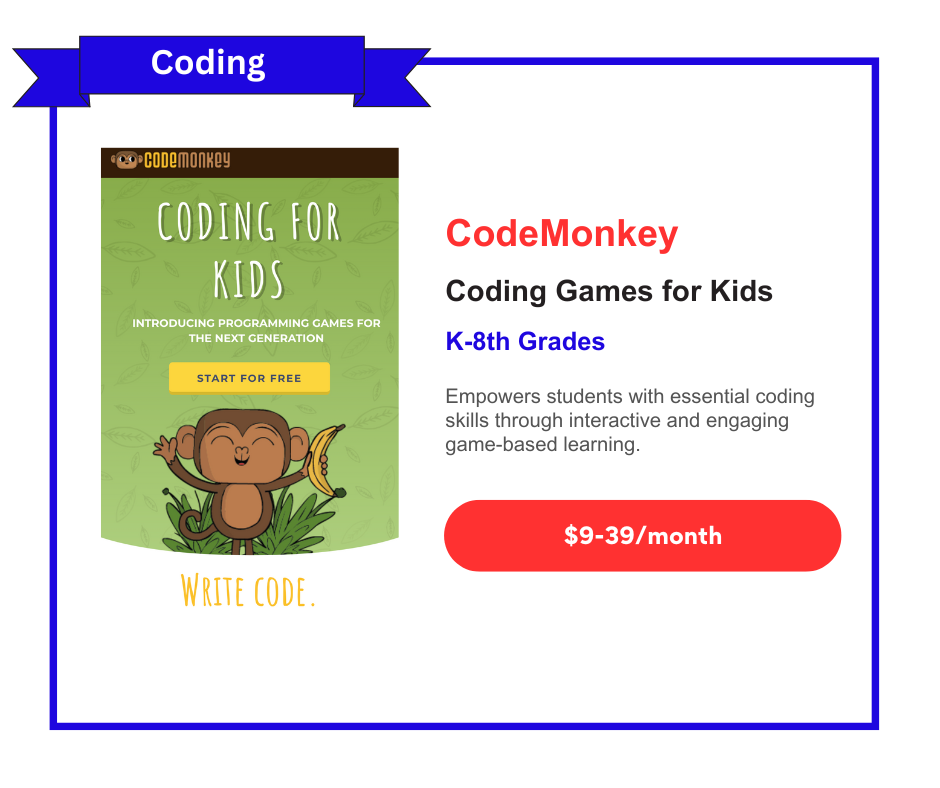
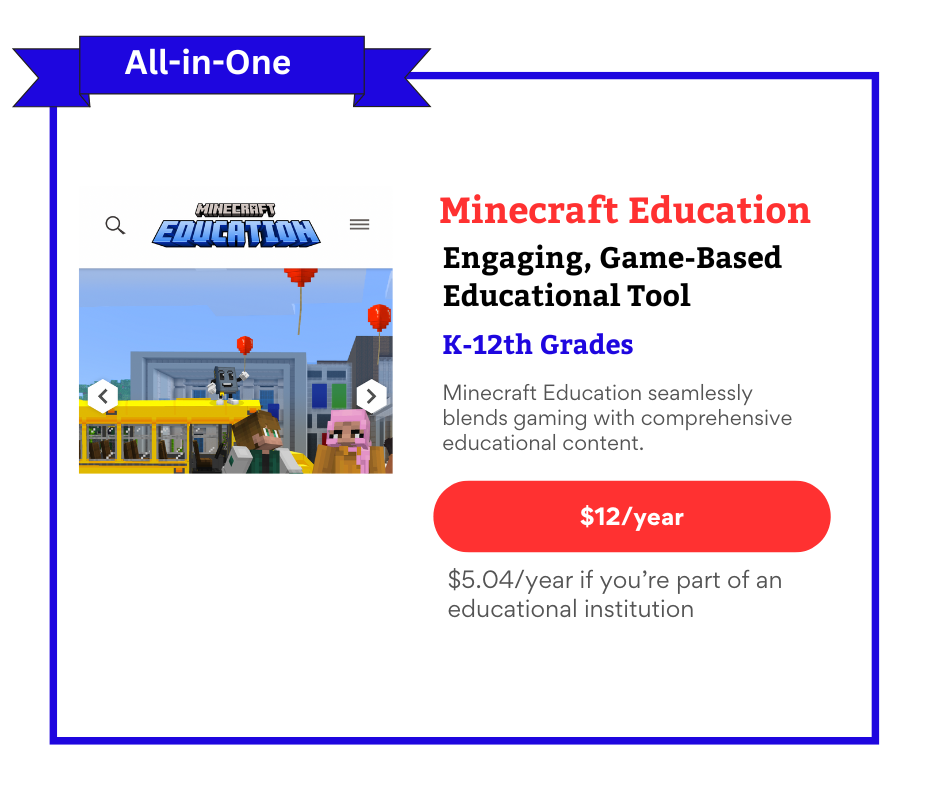
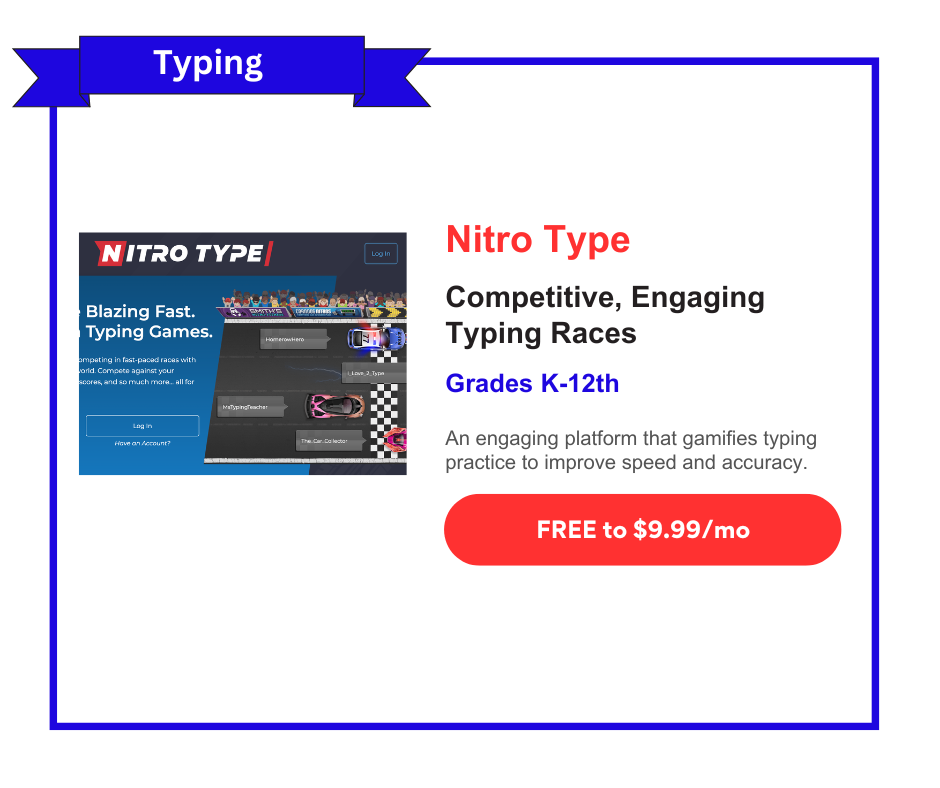
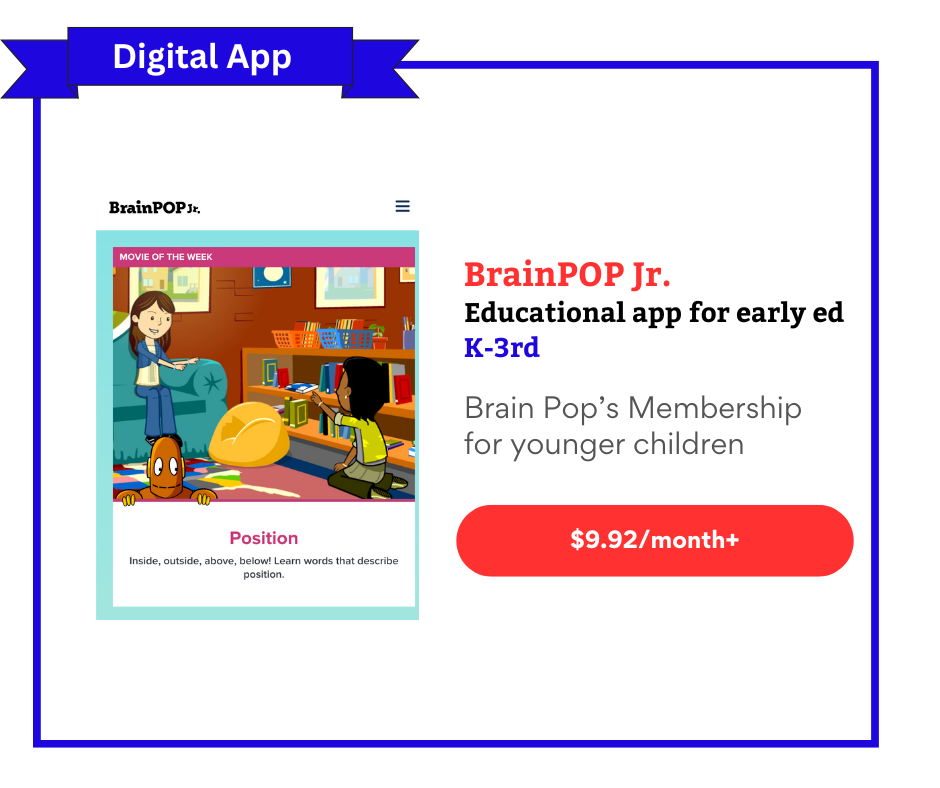


ScratchJr. The baby version of Scratch, Scratch Jr is a fun, simple program to use if Scratch is too challenging for younger kids. It includes guides for instruction and 75+ activities. Like Scratch, it is more exploratory and less directional, which some parents dislike.